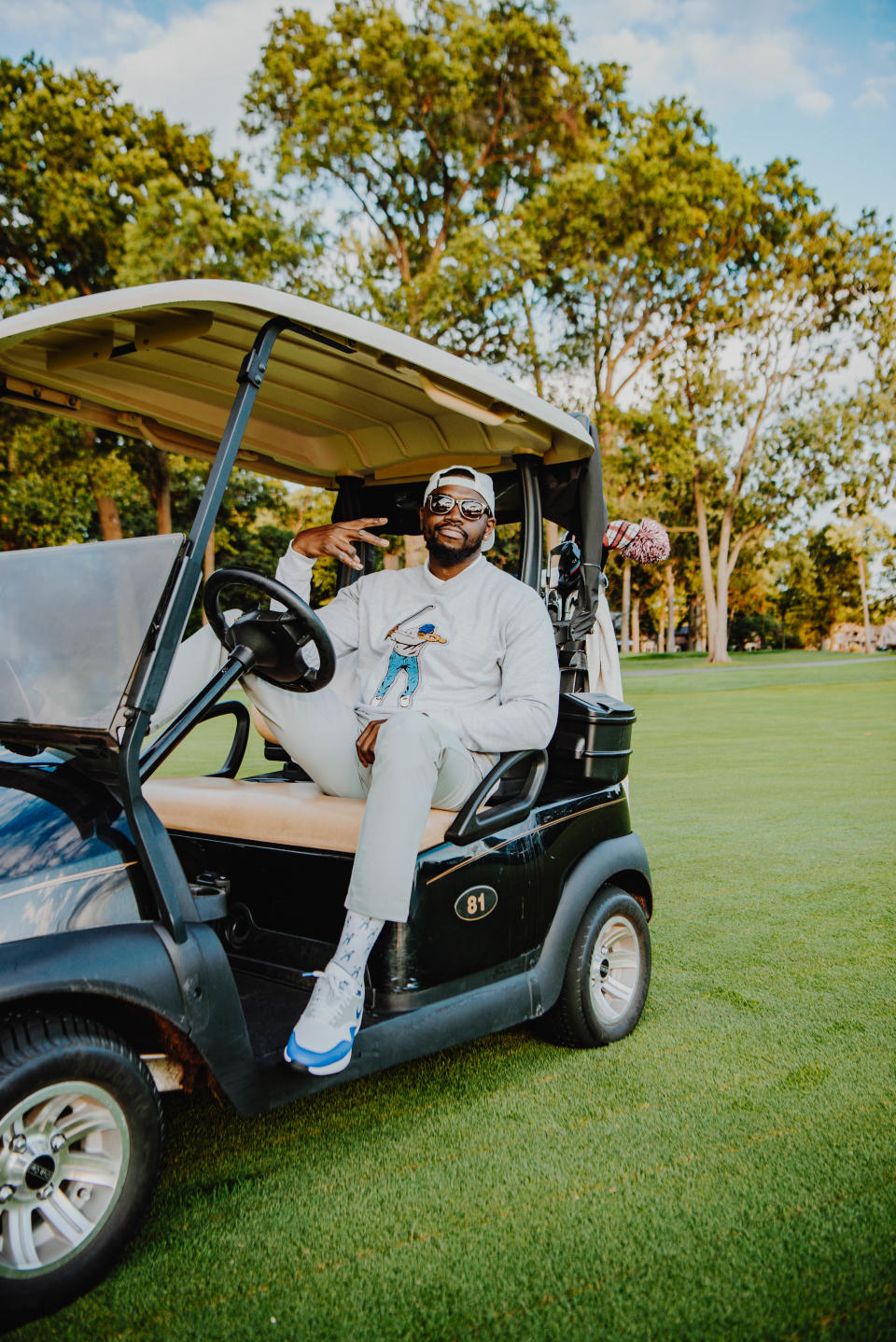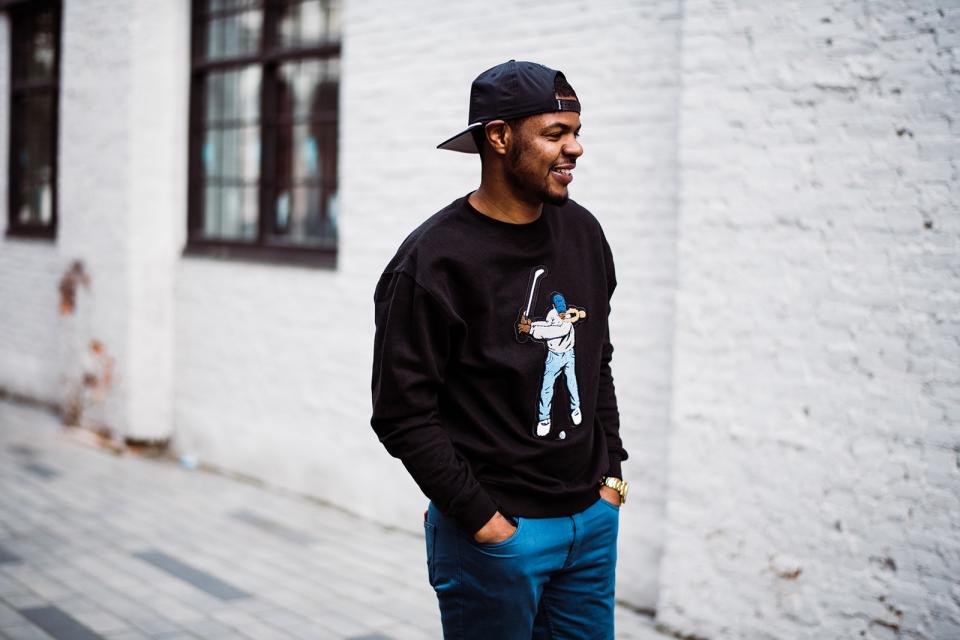The Black-Owned Brand Bringing Streetwear to the Golf World
The evening of August 26th, in a Walt Disney World hotel ballroom inside the NBA Bubble, hundreds of players and coaches convened for a meeting in response to the police shooting of Jacob Blake, a 29-year-old Black man from Kenosha, Wisconsin. Leading the group was the president of the NBA Players Association, then–Oklahoma City Thunder guard Chris Paul, one of the most vocal of a generation of players who had started to display messages of social justice on the backs of their jerseys. Paul, who in recent years has used his clothes and shoes to show support for HBCUs and the Black Lives Matter movement, had chosen a simple message for his jersey: “Equality.”
With his outfit during the meeting, he might have also been making a statement about race in another arena. An avid golfer, Paul wore three pieces by Eastside Golf, a Black-owned streetwear brand aimed at broadening the appeal of a game with a long history of racism and elitism. As he made his way around the Bubble in his gray Eastside sweatshirt, white tube socks, and blue limited edition Tournament hat, the brand gained traction on Instagram. “The cameras are glued on him and he’s wearing our stuff,” says Earl Cooper, Eastside’s brand ambassador. “He’s representing so many of our values to the world at once: golf, streetwear, social justice, and who we are as African-American men. From a fashion perspective that exposure just launched us into a whole different stratosphere.”
Founded in 2019 by Detroit-based aspiring pro golfer Olajuwon Ajanaku, Eastside has come to be embraced by other pro athletes and celebrities, including former Yankees pitcher C.C. Sabathia, Black-ish star Anthony Anderson, and 2 Live Crew founder Luther Campbell. Part of the appeal comes from its logo, which conveys the brand’s identity with powerful simplicity: a young Black man dressed in a sweatshirt and jeans with a gold chain around his neck and a club in mid backswing. It’s an image that adorns nearly every product they sell—sweatshirts, hats, T-shirts, ball markers, and socks—and though it might look like a rebuke of the well-worn image of the conservatively dressed white country club golfer, Ajanaku, who is 31, says the idea is more personal than that. “It’s supposed to be me,” he says. “I always wear gold chains, sweatshirts, jeans, and some fly shoes. It’s the way I want to look on the golf course or at a bank job, but I know that I really can’t. I want to look like myself everywhere I go.”

In golf, the logos and club insignias that players wear on their shirts and hats often signify power and memberships to exclusive clubs. For many of us, wearing these fancy logos has been a way of capturing a degree of belonging to these mostly white exalted spaces. Ajanaku and Cooper, who met as golf teammates at Morehouse College, in Atlanta, have worn some of these labels themselves, but the only brand they want to wear now is their own. “There has never been a brand like us to speak authentically and knowledgeably to both sides—golf and urban culture,” Ajanaku says.
Cooper, a dapper 31-year-old PGA Teaching Professional, joined the company in early 2020, bringing with him a long Rolodex of influential friends and former students (including President Joe Biden, whom he met when he worked at Wilmington Country Club, in Delaware). Cooper was drawn, he says, to Ajanaku’s vision after himself wrestling with the duality of being a Black PGA club professional in a largely white golf industry. “Olajuwon wants to create a lifestyle brand that’s rooted in golf, but that represents African-Americans and is agile enough to navigate both worlds,” he says. “It’s not built to be put in a box.”
Ajanaku and Cooper each came to understand that duality as kids taking up the game at city public courses. The brand takes its name from the Eastside of Atlanta, where Ajanaku grew up with a single mother who at times worked three jobs to support her family. Ajanaku was often forced to take a bus to his local course. When he couldn’t catch the bus, he would hit balls from his living room through a patio door into a lake behind his apartment complex. As a teenager he played for money against drug dealers. “If I played good I had some money for dinner,” he says. A favorite post-round activity for Ajanaku and his crew was to drop an empty glass on the clubhouse floor and start a putting contest. “It was almost like a dice game,” he says. “There might be $1,000 on the ground, and everybody was making bets on me making a putt. That was a lot of pressure. I had never seen that type of money. That’s how I got my competitive spirit.”
Cooper remembers being a kid in Wilmington walking the mile from his apartment complex to the course with his golf bag. On his walk, he could see how the houses got bigger and nicer as he got closer to the golf course. “That was an interesting journey for a young Black male,” he says. “There was a level of insecurity and a lack of confidence because I’m wearing all golf clothes and carrying a golf bag. How many times have you seen a Black kid walking the streets with his golf clubs? It just doesn’t happen.” Later, when his family moved to a house right off Ed Oliver Golf Course near downtown Wilmington, Cooper’s father cut a hole in the fence at the 6th fairway so that his son wouldn’t have to climb the fence with his bag or walk the long way to the clubhouse.

Eastside Golf: Golf Course and Lifestyle shoot
In January 2020, the duo made their first trip as a company to Orlando for the PGA Merchandise Show, golf’s largest industry gathering. With backpacks full of gear, Ajanaku and Cooper walked through a sea of mostly white vendors looking to make connections that might lead to a store picking up their line of merchandise. By early May they had a request for 50 sweatshirts from a Japanese boutique that sold out in less than 24 hours. “We had confidence that we would capture Black people, but we’ve been pleasantly surprised with the response from other groups,” Cooper says. “The culture of hip hop, golf and race and streetwear is such a melting pot.”
Over the summer, as the country reeled from the murders of George Floyd, Breonna Taylor, and other innocent Black men and women, Eastside Golf challenged the game’s establishment. “It was our Emmett Till moment,” Cooper says of Floyd’s killing. In late May, he wrote a letter to the PGA of America CEO Seth Waugh and other leaders in the organization asking why they had stayed silent on the subject of racial justice when other leagues had made such strong statements. After what Cooper and Ajanaku call a tepid response, they realized they could have a larger impact on the social justice movement if they leveraged Eastside’s influence to spread a message. They produced a three-minute Instagram video featuring a group of PGA members stating their support for Black Lives Matter. It drew a swift response from the PGA, which reposted it to their social media accounts in solidarity. “It was a huge accomplishment for us to get the PGA’s attention,” Cooper said. “I was worried if it failed that I might be blackballed in the organization.”
Now Eastside Golf is attracting new investors, according to Ajanaku, and he says there’s a deal on the horizon with a major sports apparel company. They aim to one day have a head-to-toe apparel line, a golf academy, and a nonprofit focused on growing the game in the Black community and increasing the number of Black touring and club professionals. They aren’t scared of the growth. “We just need to bring ourselves to the golf course,” says Ajanaku. “We’re going to succeed as long as we can make clothes that speak to us.”
Originally Appeared on GQ

